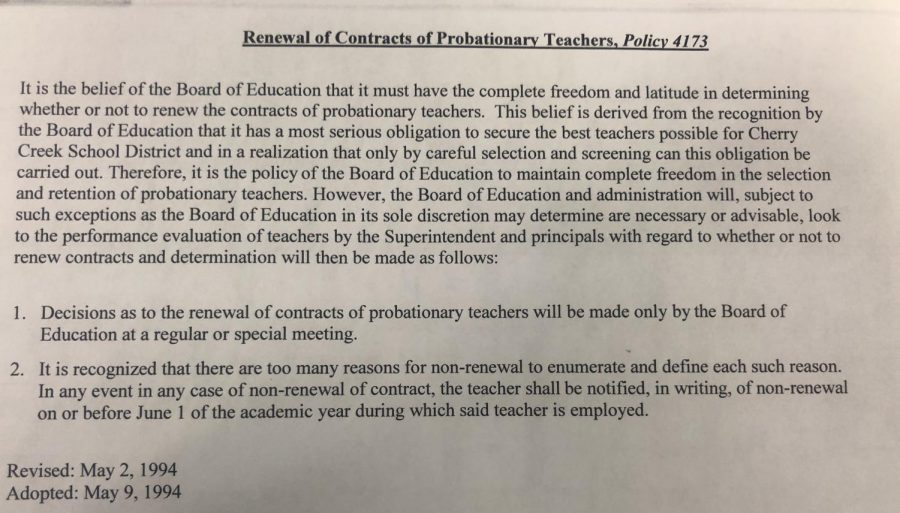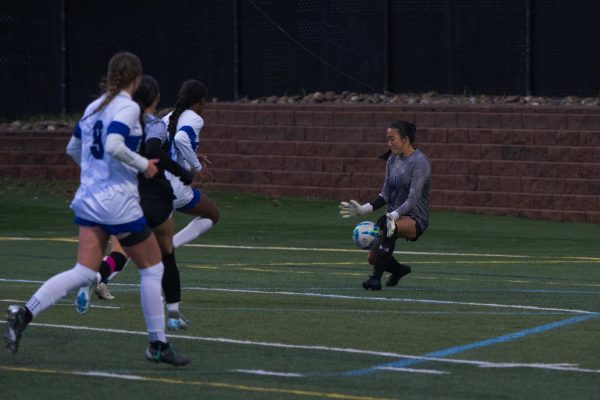Probation: Teachers Most Stressful Time Period
In the Cherry Creek School District, first and third-year teachers are put through a series of assessments called prohibition. This nerve-wracking experience can either make or break a teacher’s career because of the process that goes into it.
“A probationary teacher is somebody who is in those first 3 years in the district,” Principal Dr. Roberts said.
Amongst the current total staff at Grandview, which includes 170 faculty members, 16% are still in their probationary years.
The decision to renew or non-renew is left up to Dr. Roberts and her fellow administrators, who look for a variety of academic understanding of the educational systems.
“[We look for] knowledge of the standard,” Roberts said. “Are you assessing the standards? Do your lessons link to the Colorado adamic standard so your assessments are in line with those.”
Along with knowledge of the general education curriculum of the state, there are other things that Roberts and other evaluators look into.
“There are things like professionalism,” Roberts said. “ How do you work with your colleagues? How do you connect with kids? How are you engaging students in culturally responsive lessons?”
While the probationary process is left up almost entirely to Dr. Roberts’ own judgment, she lets two main views guide her decisions.
“First, [we always] seek first to understand,” Roberts said. “The other thing we often talk about is assuming positive intent.”
Not only are teacher opinions taken into consideration, but student experiences in the classroom are also calculated as well.
“When we are in classes we ask kids, and it’s not always do you like your teacher,” Roberts said. “It’s more what are you learning.”
Where the ultimate decision of renewal is concerned, sometimes it only comes down to numbers, which cannot be helped.
“Sometimes your numbers go down and there is nothing you can do about it,” Roberts said.
Regardless of the ultimate decision of whether to renew or not, the students are the top priority. Always.
“Can we find a teacher who would be better?” Roberts said. “Now, it doesn’t mean that the teachers you have aren’t good, but could you find one that is better.”
When continuing to see if a teacher is a good fit, it can either be instant, or take years of careful evaluation.
“Sometimes you know right away,” Roberts said. “Sometimes it takes a few years.”
During the evaluation process, many different steps go into properly accessing the teacher, including direct feedback.
“I would meet with my evaluator on a one-on-one basis. We would go through a lesson that I planned to teach in the future,” social studies teacher, Mrs. Taylor said.
After reviewing the lesson plan, the evaluator would then come to a rating, and provide feedback to the probationary teacher as to what can be improved.
“You talk together on what went well, what could have been better, what I thought my strengths were,” Taylor said. “ We just kinda debrief what happened so I can make improvements for the future.”
Another shift that came to the evaluation process was the recent reduction in the annual requirements for observation times.
“A big difference between my first three years here was that I needed to get observed four times,” Taylor said. “Just this past year, they changed it so that you only have to get observed twice.”
The former probationary year, much like the rest of the world, was brought to a screeching halt with the March arrival of COVID-19.
“Cause of COVID, they told us that all paperwork was thrown out the window, and any evaluations really didn’t count,” english teacher, Mr. Eggleston said. “We would have to essentially repeat our previous probationary year.”
Another shift that came to the evaluation process was the recent reduction in the annual requirements for observation times.
The pool of probationary teachers had mixed reactions to the final decision regarding counting of the year or not.
“I was stressed, nervous, [and] kinda furious,” Eggleston said.
While the reactions to the additional year were mixed, other emotions played through teachers this season when they learned they had been renewed.
“Once I found it out, I felt mostly relieved,” Taylor said.
Even though it’s a pondering experience for teachers who have been teaching for a short period of time, Dr. Roberts mentioned about improving the district and teaching environment so students have an area to learn.
“We don’t hire to fire, we hire to coach.”













